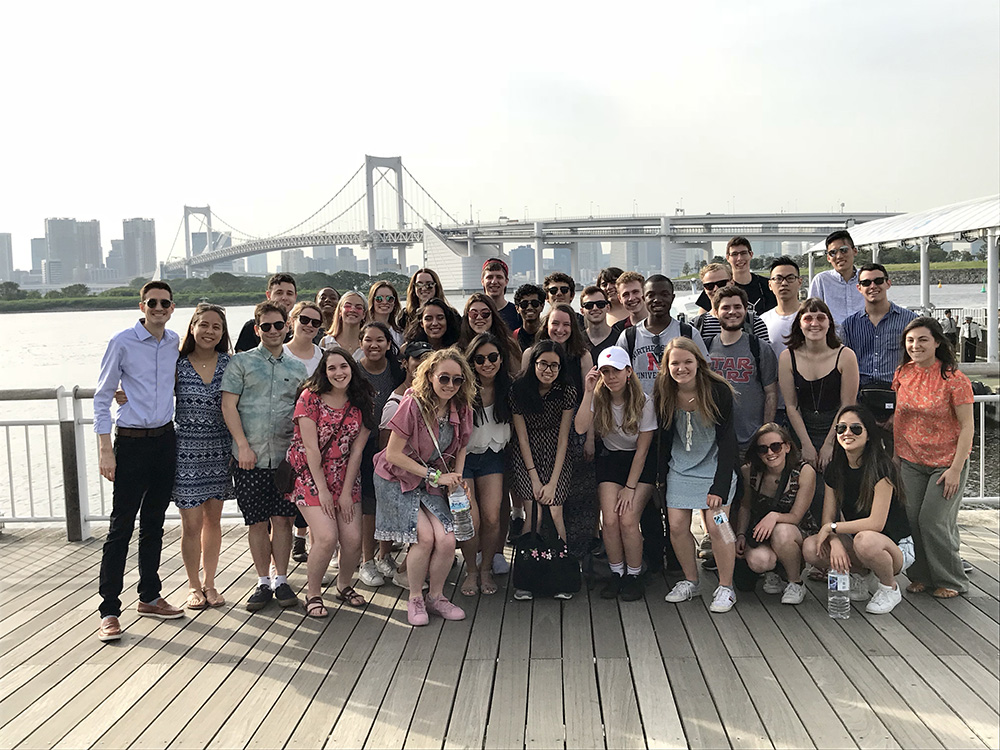Teaching
Dr. Vicino is an enthusiastic instructor, integrating local and global learning opportunities inside and outside of the classroom. Read about his educational philosophy, courses, and local and global engagement efforts.
Why do I teach? My formation as a teacher was shaped during the pursuit of my own education. For me, learning provides great opportunities for new beginnings, and it is society’s great equalizer. This belief, which shaped my decision to enter the professoriate, was deeply influenced by the dramatic journey of one of my early educators, Richard Stebbins. A gold medal Olympian, he was also a public school teacher of history and social studies. When I first met him as a student, he challenged me to think big and “go for the gold” by pursuing higher education. He instilled in me a passion for learning and a drive for knowledge that persists today. At the end of the academic year in his class, I had my photo taken with him, wearing his gold medal. At that moment, I was determined to follow in his footsteps.
Today, I carry the values that Mr. Stebbins instilled in his students. Never let the thirst for knowledge be quenched. Do not stop asking questions, and never stop pursuing truth. Always maintain the highest level of integrity and honesty. Society should look up to educators as role models. We must also share knowledge with others. An education provides both a duty and license to share this knowledge and experience with the next generation.
I seek to apply this philosophy to my career as an educator. In my own discipline, I am interested in sharing with students the art and the science of politics, the consequences of political behavior, and the dynamics of the public policymaking process. I believe that an education centered on the study of politics, public policy, and urban affairs should provide students with opportunities to synthesize a multidisciplinary range of knowledge in the social sciences. To do so, I try to provide a learning environment that draws upon this knowledge. Furthermore, I seek to develop a capacity in my students to promote the civic and public good of society in pursuit of a fair and just democracy. As a specialist of urban and public affairs, I strive to educate students about the nature and relationship of the city and metropolis—its history, its challenges, and its opportunities. I incorporate the experiential liberal arts model into my teaching to promote analytical and critical thinking using Boston, Rio de Janeiro, and Tokyo as an urban laboratories.

Exploring gentrification and urban redevelopment in Boston’s South End as part of the course Urban Politics and Policies
I have successfully developed and delivered many courses at the undergraduate and graduate levels. I have experience teaching at the comprehensive research university level and in the liberal arts classroom. I draw on these cumulative experiences to grow and further advance my teaching skills. Throughout my academic career, I have gained experience teaching undergraduate and graduate courses in Political Science, Public Policy, and Urban Affairs.
At the undergraduate level, I teach courses on: Growth and Decline of Cities and Suburbs and Urban Policies and Politics. These courses serve a multidisciplinary student body to majors in the social sciences and the minor in Urban Studies. It is a joy to teach these courses to a variety of students who come to the classroom with a multiplicity of perspectives.
At the graduate level, I teach Techniques of Policy Analysis, Seminar in Public Policy, and The Twenty-First Century City. I also developed two graduate elective courses, Urban Economic Development and Problems in Metropolitan Governance. I am also committed to mentoring doctoral students, supervising and serving on multiple dissertation committees. Above all, I work diligently to facilitate academic and professional opportunities for my students.

Exploring mega cities exhibit at Boston’s Museum of Fine Arts as part of the course Growth and Decline of Cities and Suburbs
I am an enthusiastic instructor, and my teaching is informed by my own scholarship and values for public citizenship. I have a passion for urban and public affairs, and I aim to teach students about the fundamentals of these fields while also immersing them in broader policy issues and debates. My goal is to teach students to appreciate the material and to leave them wanting to further explore the world around them. Students report that they benefit from the balance between theory and practice. Student-driven discussions and policy debates supplement lectures of my expert knowledge on theories, concepts, and ideas.
Finally, I am deeply committed to experiential education through global learning. I always strive to integrate such learning opportunities into my teaching. In 2009, I developed a new Dialogue of Civilizations program to Brazil, and in 2017, to Japan. For a decade, I have had the pleasure of teaching Political Science courses on site in these other countries as part of my commitment to short-term, faculty-led teaching abroad. In these programs, students engage in discussions about the biggest challenges facing the world’s largest cities with local policy-makers, business leaders, and non-profit groups. These courses support the student learning outcomes to integrate the comparative study of cultures and experiential learning. It is especially fulfilling to witness the outcomes, such as global cooperative learning opportunities.

Exploring new urbanism development in Tokyo as part of the course Government and Politics: Learning Abroad
